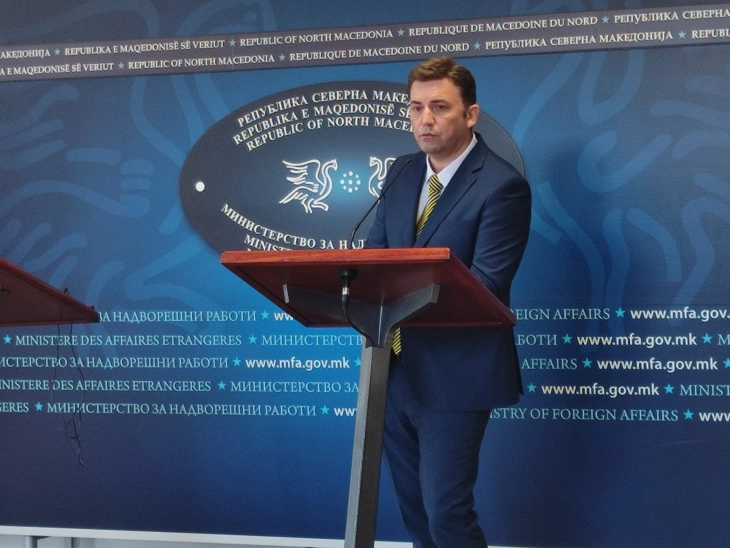Osmani: We received 2030 as a timeframe, won’t accept anything less than full-fledged EU membership
- The statement given by the President of the Council of the European Union, Charles Michel, at the Bled Strategic Forum, over enlargement by 2030, holds historic weight and makes the European perspective of the EU candidate states more credible. Now it is up to us to work with the given timeframe. We won’t accept anything less than full-fledged EU membership, said Minister of Foreign Affairs Bujar Osmani at a press conference Wednesday.
- Post By Angel Dimoski
- 14:54, 30 August, 2023

Skopje, 30 August 2023 (MIA) – The statement given by the President of the Council of the European Union, Charles Michel, at the Bled Strategic Forum, over enlargement by 2030, holds historic weight and makes the European perspective of the EU candidate states more credible. Now it is up to us to work with the given timeframe. We won’t accept anything less than full-fledged EU membership, said Minister of Foreign Affairs Bujar Osmani at a press conference Wednesday.
“What happened in Bled is a part of history, will be a part of history. I think the Bled Strategic Forum will probably hold similar weight as the Thessaloniki Summit in 2003. Because the President of the Council, in his official capacity, in the name of the EU, said that the Union will be ready to receive new members by 2030. And this is the message that we were looking for. Do you know how long I have been talking about 2030? And I think that what happened in Bled is a result of our lobbying. Because this will now give us a timeframe, an idea over what we are working for, and a date to work towards. This doesn’t mean that we will join in 2030 if we aren’t ready. It is important that Europe will open its doors by 2030,” said Osmani in answer to a journalist’s question.
Commenting on the statement made by French President Emmanuel Macron on a “multi-speed Europe”, Minister Osmani said his idea was clarified in Bled by the French Secretary of State for European Affairs, Laurence Boone, and Alexandre Adam, his advisor and creator of the French proposal.
“And they said Macron spoke about ‘multi-speed’ in terms of that not everyone will join at once, but in various speeds in terms of when they’re ready, and not a Europe of more privileged and less privileged members, because we won’t accept anything less than full-fledged EU membership. And you know, we are promoting the concept of greater integration ahead of membership, which means that, since 2030 is already fixed, let us become a member of the Union even before our membership, i.e., when we fulfill a chapter we become a part of the policy of the Union. We enter the single market, have access to the funds. Even before our membership we will be in the Union, the only thing we won’t have is the right to vote, which we will get on the day of membership,” said Minister Osmani.
According to the Foreign Minister, in this way, the country will have annual targets to reach instead of a single, long-term target which is a bit far, and, he stressed, “creates frustrations, disappoints the citizens, and others (third parties) abuse those disappointments.”
“I think that as of yesterday we have a really credible perspective. Now the ball is in our court. I think now we just need to come together to do what I’ve been asking for, for a long time now – a cross-party national agreement. So all parties can sit down and say EU 2030 is our goal, let’s put these daily political topics aside, we will discuss everything else,” said the Foreign Minister.
Regarding the European Commission’s response to Michel’s statement, Osmani noted the difference between the two institutions, saying the European Council includes the member states who adopt the political decisions, while the Commission does not have a political mandate, but only objectively assesses if the country fulfills the criteria.
“And that’s why the Commission says the political decisions are made by the member states, for us, it is important who fulfills the criteria because we make the reports. So, the European Commission does not dismiss Charles Michel’s message, only says you decide the timing, for me, it is important that you’ve fulfilled the criteria, because both institutions see different perspectives from enlargement,” said Osmani.
According to the Foreign Minister, the issue with the current model of integration is that it is “all or nothing”, which, he said, creates frustrations because the road is long, unpredictable and with difficult compromises. “The concept of greater integration ahead of membership, towards which we are working,” said Osmani “is already becoming a basis for discussions in Brussels.”
Asked about the parliamentary session on the constitutional amendments, Osmani said he is personally focused on the “bigger picture”, i.e., dismissing all speculations related to the process. He said the negotiating framework is founded on two basic principles, “a big no to historical and identity issues in the negotiating framework, and a big yes for human rights.”
“Unfortunately, if we ask the citizens a big portion of them are not convinced, and rightly so, because they’ve been disappointed for a long time. But, my mission is, through arguments, to reach every single one of them and say that we weren’t able to get a better agreement, that this is the best we could get and the best we’ll ever get, to move away from the historical and identity issues towards human rights. That is our ground, no one can beat us there because this is the field where we are the best,” said Osmani.







